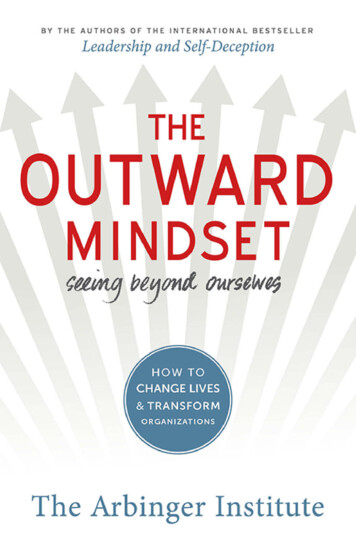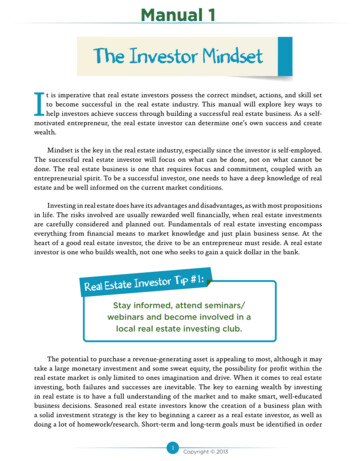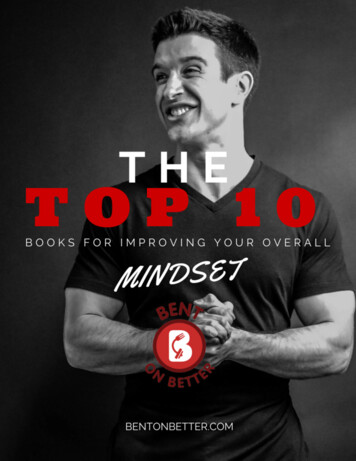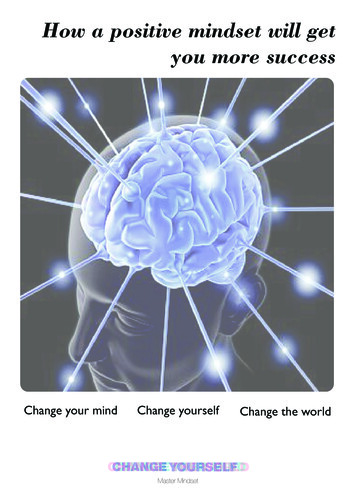
Transcription
Mindset The New Psychology of Success - How We Can Learn toFulfill Our Potential. Parenting - Business - School Relationships by Carol S. Dweck, Ph.D. 2008 Ballantine Books Trade Paperback Edition: New York,NY. ( 16.00 U.S.A. 19.95 Canada - A great deal either way.) Summary by Douglas W. Green, EdD dgreen@stny.rr.comFor More Go To DrDougGreen.ComIf you like this summary, buy the book.1Wednesday, April 7, 2010
A Simple Belief About Yourself The purpose of this book is to help you learn how a simplebelief about yourself guides a large part of your life. It permeatesevery part of your life. Much of what you think about yourpersonality grows out of your “mindset.” Much of what may bepreventing you from fulfilling your potential grows out of it.Your true potential is unknown and unknowable. The hand youare dealt is just the starting point for development. If youbelieve that your qualities are carved in stone (the fixed mindset)you must prove yourself over and over. Dweck draws on twentyyears of research to show that the view you adopt for yourselfprofoundly affects the way you lead your life.For More Go To DrDougGreen.ComWednesday, April 7, 2010If you like this summary, buy the book.
Estimating Your Own Ability Studies show that people with growth mindsets tend to beaccurate in assessing their own abilities, even if it isunflattering. If you are oriented toward learning, you needaccurate information about your current abilities in order tolearn effectively. Howard Gardner is quoted as saying thatexceptional people have “a special talent for identifyingtheir own strengths and weaknesses.” They also have aspecial talent for converting life’s setbacks into futuresuccesses. Creativity research sees this as the number oneingredient in creative achievement. Dweck’s key message isthat you can change your mindset. Mindsets are just beliefs.For More Go To DrDougGreen.ComIf you like this summary, buy the book.3Wednesday, April 7, 2010
Mindsets and Personality Beyond intelligence, fixed and growth mindsets impact yourpersonality. People with fixed mindsets believe that they arewhat they are and cannot change. They want to be praisedand not challenged. Those with growth mindsets want toget better and are accepting of people who point our theirshortcomings. Marriages between different mindsets can fallapart as a result. Top performers in sports are those whoconstantly push themselves to be better. If you get a thrillfrom what’s easy, you may have a fixed mindset. If you enjoywhat is difficult, you may have a growth mindset. You thinkthat becoming is better than being.For More Go To DrDougGreen.ComIf you like this summary, buy the book.4Wednesday, April 7, 2010
What do the experts know? If you have a fixed mindset, you think that tests and expertscan somehow tell you what your potential is. Manyaccomplished people were thought to have little potential.Dweck lists Jackson Pollock, Marcel Proust, Elvis Presley,Ray Charles, Lucille Ball, and Charles Darwin as examples.Look for students who are energized by criticism. (Doug:My daughter studied fine arts at Pratt Institute in Brooklyn,NY. Every day she had to endure criticism of her work. As aresult, she got better and better. After graduating in 2006she immediately got work in the competitive art industry inNew York City and has worked ever since.)For More Go To DrDougGreen.ComIf you like this summary, buy the book.5Wednesday, April 7, 2010
Jordan Rules Unlike some sports stars, Michael Jordan had to work hardto succeed. He had to struggle and grow as he was notinherently better than others. (Doug: Jordan could not makehis high school’s varsity basketball team as a sophomore.) Ifyou have a fixed mindset, you let failure be transformedfrom an action (I failed) to an identity (I am a failure). If youhave a growth mindset, failure can be painful, but you don’tlet it define you. You face it, deal with it, and learn from it.For More Go To DrDougGreen.ComIf you like this summary, buy the book.6Wednesday, April 7, 2010
Study Harder or Less Hard? In one study, seventh graders told how they would respondto failure. Those with a growth mindset said they wouldstudy harder. Those with a fixed mindset said they wouldstudy less since they didn’t have the ability and didn’t wantto waste there time. It is effort that ignites the ability thatyou have. There is a risk, however. Once you start to put inthe effort, it robs you of all of your excuses. Think aboutwhat you want to look back and say about your life. Thenchoose your mindset.For More Go To DrDougGreen.ComIf you like this summary, buy the book.7Wednesday, April 7, 2010
Motivation and Stereotypes Students with a growth mindset tend to take charge of theirlearning and motivation. Instead of plugging into unthinkingmemorization, they look for underlying principles. They studyto learn, not just ace the test, and this is why they get highergrades. Studies of outstanding achievers shows that theircontinued motivation, commitment, and network of supporttook them to the top. They also don’t believe that negativestereotypes can hold them back. A growth mindset helps peopleto see prejudice for what it is - someone else’s view of them and to confront it with their confidence and abilities intact.This is good for women and minorities.For More Go To DrDougGreen.ComIf you like this summary, buy the book.8Wednesday, April 7, 2010
The Mindset of a Champion In the chapter on sports, Dweck gives many examples of peoplewho made it to the top of their respective games by using thegrowth mindset to overcome short-term failures. They takecharge of the processes that bring success. If you think you’re afinished product or you’re nobody if you don’t win, you have afixed mindset. Mental toughness and heart are stronger thansome of the physical advantages you might have. This helpsdevelop character, which is the ability to dig down and findstrength, even when things are going against you. Charactergrows out of mindset. It can be learned. This allows a championto raise their level of play when they need to.For More Go To DrDougGreen.ComIf you like this summary, buy the book.9Wednesday, April 7, 2010
Business Leaders Mindsets Business cultures that worship talent force employees into fixedmindsets. The minute a leader allows himself to become theprimary reality people worry about, you have a recipe formediocrity or worse. Bosses who are controlling and abusive puteveryone into a fixed mindset. Instead of learning and growing,people worry about being judged. Successful leaders tend to beself-effacing people who constantly ask questions and confrontthe most brutal answers. They look failure in the face, even theirown, while maintaining faith that they will succeed in the end.They highlight the contributions of others and believe in humandevelopment.For More Go To DrDougGreen.ComIf you like this summary, buy the book.10Wednesday, April 7, 2010
Love and Mindsets Almost everyone, at one time or another, has been in loveand has been hurt. People with a fixed mindset feel judgedand labeled by rejection. Their number one goal tends to berevenge. People with growth mindsets are more likely toforgive and move on. They do not feel permanentlybranded. They try to learn something useful aboutthemselves and relationships that they can use in order tohave a better experience the next time. The same conceptsapply to other relationships like those between parents andchildren and between friends.For More Go To DrDougGreen.ComIf you like this summary, buy the book.11Wednesday, April 7, 2010
Messages From Parents and Teachers Words and actions of adults send messages to children that helpsform their mindset. Messages that say “you have permanent traits and Iam judging them” build fixed mindsets. Messages that say “you are adeveloping person and I am interested in your development” build growthmindsets. Praising children’s intelligence harms their motivation andtheir performance. If you tell a child they are smart, they will doubtthemselves as soon as anything is difficult or anything goes wrong.Children should be encouraged to enjoy effort, be intrigued bymistakes, and keep on learning. Praise the effort part of anyaccomplishment. Messages need to honest, but can still be caring.Avoid judgements! Also, don’t assume that children are too young topick up on mindset messages. They also pass then on to each other.For More Go To DrDougGreen.ComIf you like this summary, buy the book.12Wednesday, April 7, 2010
Great Teaching/Coaching Great teachers need growth mindsets and must be determined tocreate growth-minded students. They must be model learners. Theyhave high expectations of all students and constantly show them howthey have grown. They let students know that they all have talent, butthat more talent can be acquired. “Don’t expect success to come toyou. You have to go get it.” They have to care about every student andbe warm and accepting at the same time they let students know howthey are doing and what the plan is for moving forward. Theychallenge and nurture at the same time. Coaching can be the same.The best coaches try to instill the idea that you can get a little betterevery day. As a result, over a period of time you will become a lotbetter. The best coaches also prepare players for life.For More Go To DrDougGreen.ComIf you like this summary, buy the book.13Wednesday, April 7, 2010
Changing Mindset: A Workshop If you have a growth mindset, you must believe thatmindsets can be changed. The final chapter focuses onchanging one’s internal monologue from a judging one to agrowth-oriented one. Dweck describes a workshop that isnow available as animated lessons called Brainology. Here isthe web site that you can check out. They were nice enoughto give me a look and I am impressed. Keep in mind that Ihave been reviewing kid’s software since 1979. http://www.brainology.us/ This chapter also contains a number ofdilemmas that you can work through by yourself or withpeople you lead.For More Go To DrDougGreen.ComIf you like this summary, buy the book.14Wednesday, April 7, 2010
Cool Quotes “Not only do genes and environment cooperate as we develop, but genes requireinput from the environment to work properly.” Gilbert Gottlieb “It’s not always the people who start out the smartest who end up the smartest.”Alfred Binet (Inventor of the IQ Test) “You aren’t failing until you start to blame.” John Wooden “If you walk off the field knowing that you gave everything you had, you willalways be a winner.” Mia Hamm “I wish to have as my epitaph: ‘Here lies a man who was wise enough to bringinto his service men who knew more than he.’ ” Andrew CarnegieFor More Go To DrDougGreen.ComIf you like this summary, buy the book.15Wednesday, April 7, 2010
What I Left Out Carol Dweck has so many cool stories and examples to support herthesis that it would be impossible to give them justice in thesummary. If you purchase this book you can read about the footballplayer who scored for the other team and went on to win and thechief who killed himself. Other stories include Muhammad Ali, BillyBeane of Moneyba! fame, Michael Jordan, Babe Ruth, and WilmaRudolph. In the business chapter, she explains how Lou Gerstner ofIBM and Jack Welsh of GE exemplify the effectiveness of growthmindsets at the top. In the chapter on relationships Dweck brings inthe subject of bullying. Teachers and principals should take specialnote of this section as well as the entire chapter on parenting,teaching, and coaching. The John Wooden story is very special.For More Go To DrDougGreen.ComIf you like this summary, buy the book.16Wednesday, April 7, 2010
Mindset The New Psychology of Success - How We Can Learn to Fulfill Our Potential. Parenting - Business - School - Relationships by Carol S. Dweck, Ph.D. 2008 Ballantine Books Trade Paperback Edition: New York, NY. ( 16.00 U.S.A. 19.95 Canada - A great deal either way.) Summary by Douglas W. Green, EdD dgreen@stny.rr.com 1 Wednesday, April 7, 2010. For More Go To DrDougGreen.Com











